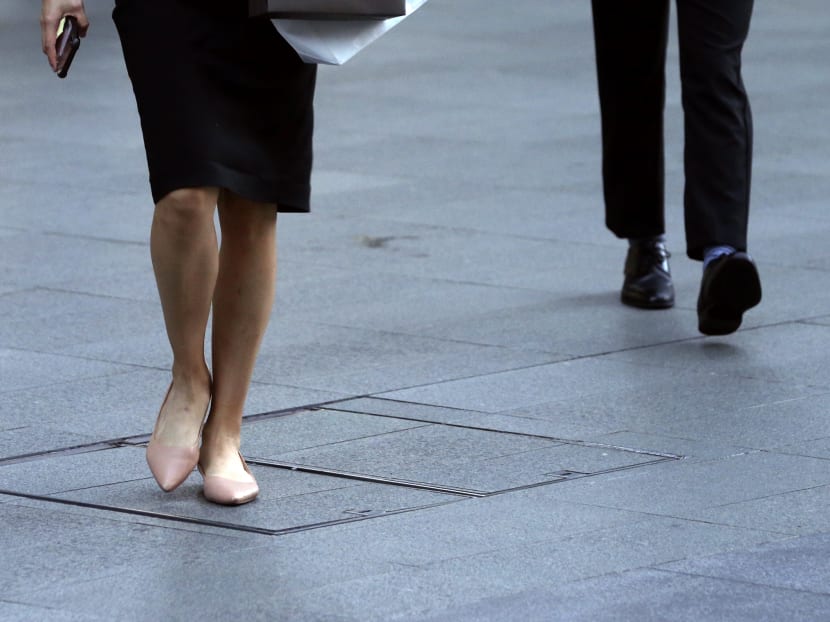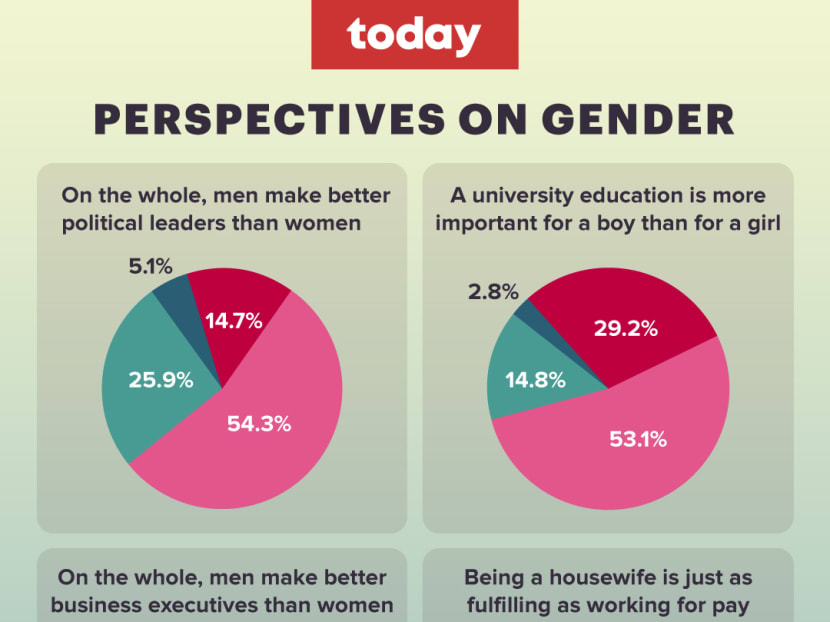Singaporeans more supportive of gender equality, disagree that men make better leaders: IPS study
SINGAPORE — The majority of Singaporeans disagree that men make better business and political leaders or that a university education is more important for men than women, a study on Singaporeans' values has found.

To study the degree of gender equality within Singapore, respondents were asked six statements that reflected traditional gender beliefs, which include men making better leaders in politics and business, and university education being more important for men.
- A study, titled Our Singaporean Values, polled 2,012 Singaporeans
- To study the degree of gender equality within Singapore, respondents were asked six statements that reflected traditional gender beliefs
- The statement, “Being a housewife is as fulfilling as working for pay” is the only one that got some degree of agreement
SINGAPORE — The majority of Singaporeans disagree that men make better business and political leaders or that a university education is more important for men than women, a study on Singaporeans' values has found.
The Institute of Policy Studies, which released the findings on Wednesday (Feb 3), also said that most Singaporeans disagree that men should be prioritised over women for hiring during a jobs-scarce climate or that problems would arise if a wife were to earn more than her husband.
The study, titled Our Singaporean Values, polled 2,012 Singaporeans for the latest instalment of the World Values Survey, which is conducted once every several years. It asks people from 80 countries about their thoughts on a wide range of issues, including politics, attitudes towards work and family and gender equality.
To study the degree of gender equality within Singapore, respondents were asked whether they agreed or disagreed with six statements that reflect traditional gender beliefs, which include that men make better leaders in politics and business and that university education is more important for men.
Only about one in five Singapore respondents agreed with all the statements, the study found.
On whether men make better political leaders than women:
5.1 per cent strongly agreed
25.9 per cent agreed
54.3 per cent disagreed
14.7 per cent strongly disagreed
The researchers noted that in 2002, 56.3 per cent of respondents either agreed or strongly agreed with this statement, compared with 46.5 per cent in 2012 and 31 per cent now, indicating greater acceptance towards female politicians over the years.
On whether men make better business executives than women:
2.2 per cent strongly agreed
21.2 per cent agreed
56.5 per cent disagreed
20.1 per cent strongly disagreed
Here, too, Singaporean values have shifted, the researchers noted. Only 23.4 per cent of respondents agreed or strongly agreed with this statement, down from 39.4 per cent in 2012.
The study found that the statement about university education being more important for boys than girls had the least agreement among the questions asked:
2.8 per cent strongly agreed
14.8 per cent agreed
53.1 per cent disagreed
29.2 per cent strongly disagreed
Only 17.6 per cent of respondents agreed to this statement in 2020, down from 26.1 per cent in 2012, showing that fewer Singaporeans now subscribe to gendered privileges, the researchers said.
While a majority of the respondents disagreed with statements reflecting traditional gender ideology, the statement, “Being a housewife is as fulfilling as working for pay” got some degree of agreement.
On this:
12.1 per cent strongly agreed
54.8 per cent agreed
27.6 per cent disagreed
5.6 per cent strongly disagreed
Similar sentiments were expressed in 2012, with 66.4 per cent either strongly agreeing or agreeing with the statement, compared with 66.9 per cent today. In 2002, 75.3 per cent felt that way.

MEN SHOULD NOT BE PRIORITISED OVER WOMEN FOR HIRING
The World Values Survey posed two other scenario-based questions on gender: Whether men should have more rights to a job than women if jobs were scarce, and whether women earning more than their husbands would inevitably cause problems.
Unlike the choices given for the other questions, respondents here were given an option for a neutral stance.
The sentiment that men should have a greater right to a job than women when jobs are scarce garnered disagreement from a majority of the population:
14.7 per cent strongly disagreed
37.5 per cent disagreed
19.9 per cent remained neutral
27.9 per cent either agreed or strongly agreed
Beliefs have shifted: In 2012, respondents were evenly spread between being agreeable, disagreeable and remaining neutral, although there was an inclination to disagree with the statement in 2002, the researchers said.
Most respondents also disagreed that problems may arise if a woman were to earn more money than her husband:
10.3 per cent strongly disagreed
41.8 per cent disagreed
26.4 per cent remained neutral
1.9 per cent strongly agreed
19.6 per cent agreed
It appears that attitudes towards this scenario have liberalised, given that only 34.8 per cent of the respondents in 2012 said that they disagreed with the statement, 42.8 per cent remained neutral, and 22.4 per cent agreed, researchers noted.
Summing up the responses to the six questions into an overall index on gender equality, Singapore scored a mean of 16.39. Higher scores indicate stronger support and the maximum score was 24.
“It hence appears that the overall population is quite supportive of gender equality values, given that the mean is 16.39, above the midpoint of 12,” the researchers said.
They noted that in Singapore, some sectors that have seen a lower representation of women included Parliament and corporate boards, but in both cases, there has been steady progress in achieving greater representation in recent years.
However, they also said: “Beyond sectoral representation, there are ongoing concerns that while women are well-represented at the workforce, traditional gendered divisions of labour still occur in the household, making it harder for women to achieve progress.
“This is especially so if the dominant view and expectation at both the household and state level is that the primary role of women is motherhood.”











